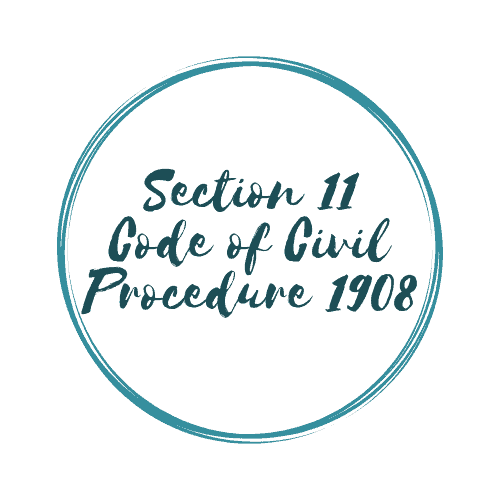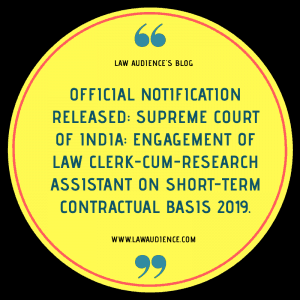AUTHORED BY: MS. KAJAL KUKREJA, LL.B, FINAL YEAR STUDENT AT NEW LAW COLLEGE, BHARATI VIDYAPEETH DEEMED UNIVERSITY & RESEARCH WRITER AT LAW AUDIENCE: EDITED BY: MS. SAKSHI SONKER, B.A.LL.B, 4TH YEAR STUDENT AT RAJIV GANDHI NATIONAL UNIVERSITY OF LAW, PUNJAB.
ABSTRACT:
This short article is aimed at explaining the concept of Res-Judicata. As we all know every law which is made by the statute is based on some principles. The transformation is taken from the English Common Law System. These are governed by the reality of jurisprudence which advises the decisions of the judiciary and it helps in protecting the rights of a citizen. The origin of Res- Judicata is not properly discovered. It is based on the public policy. In India it is adopted under Section 11[1] of the Civil Procedure Code, 1908 and after that it is adopted by the whole legal system. In a modern society everyday there are various disputes and because of that the courts are having many cases to solve. Because of this there is a need of certain principles and it is one of them which mean that till the case gets final decision, this provision prevents a person to move to the court again and again. Therefore, this provision is very essential for every society.
INTRODUCTION:
In the Law of Roman, there is a maxim“ex captio res judicata” which means for any individual dispute one suit and one decision is sufficient. This doctrine is accepted by the whole legal system. In India, it is regulated under Section 11 of Civil Procedure Code, 1908 which says that if once a matter is decided finally by the court which has jurisdiction, then no other party is allowed to open it again in any other suit.
As explained by J. Das Gupta in the case of Satyadhyan Ghosal v. Deorjin Debi (AIR 1960 SC 941) [2] – The Court held that the principle of res judicata is based on the necessity to provide finality to judicial decision. Thereafter, in the absence of this rule there will be no end of the litigation and the parties would be in trouble and have to pay expenses. Basically, this principle is not a work of the law but it is just a gift of the public policy.
OBJECTIVE:
It is based on three maxims which are as follows:-
- Nemo debet bis vexari pro una et eadem causa: This maxim says that no person should be punished for the same cause twice.
- Interest reipublicae ut sit finis litium: This maxim says that there should be an end of every dispute which works in the interest of the state.
- Res Judicata pro veritate occipitur: The decision of the judiciary must be accepted correctly.
In the case of Lal Chand v. Radha Krishan [(1977) 2 SCC 88 ] [3] – It was held that this doctrine is made to maintain the effect of the earlier judgment which was given by the competent court and to prevent injustice which is caused to the parties and also to avoid the unnecessary use of the resources.
FACTORS OF BINDING DOCTRINE OF RES-JUDICATA:
There are various factors which should be met while binding this doctrine which are as follows:
- Cause identity
- Identity of the thing
- Party’s identity
- Whether it was final judgment
- Whether parties was given full opportunity of being heard.
ESSENTIALS TO RES JUDICATA (SECTION 11 of CIVIL PROCEDURE CODE, 1908):
There are various conditions which should be satisfied which are mentioned below:-
- There must be two suits i.e. one suit which is decided earlier and another is instituted later. However, it will not affect that when the suit was begun but it will matter that when the decision was given by the court. Let’s take an example for this.
Suit
| Suit filed on | Suit decided on | Former suit |
| 5/10/2013 | Pending | No |
| 4/11/2014 | 10/11/ 2017 | Yes |
- The matter of issue must be directly related to the previous suit. It should not be incidental. For example- ‘X’ and his father file a suit against his mother’s brother to claim a share in some property. This was dismissed by the court.
- As the doctrine of res judicata cannot prevent them to claim the expenses of marriage as it was not an issue in the previous suit.
- The parties must be same i.e. whose name was mentioned at the time of the decision given by the court. If anyone withdraws his name then he will not be considered as a party anymore. Though if any minor is not represented by any guardian then it will not be considered as a party. Further, if any decision is given by the court in favour or against of any party then the decision must be binding on all of them whether their legal heirs or representative. For example – If any decision is given by the court for the ownership and possession of the property then the legal heirs will be considered that decision after the death of that person and the principle of res judicata will apply.
- In the suit the title must be same.
- The decision must be given by the court which has jurisdiction. However, the principle will not be applicable on that decision which is given by the court which has no jurisdiction.
- It must be decided and heard by the court.
Manohar Lal v. Seth Hiralal [AIR (1962) SC 527] [4] – In this case it was held that the court cannot proceed with the suit which is filed later but the provisions of Sec 10 are mandatory and there is no choice which is given to the court.
Pukhraj D. Jain v. G. Gopalakrishna [(2004) 7 SCC 251] [5] – In this case it was held that if the later suit can be decided on a legal point then it is open for the court to decide the matter.
DOES RES JUDICATA APPLY TO WRIT PETITION?
In the case of Daryo Singh v. State of U.P. (1961 AIR 1457, 1962 SCR (1) 574)[6] The petitioner has filed a writ petition under article 226 in the Allahabad High Court which was dismissed by the court. Then, he filed under article 32 in Supreme Court for same matter. The Supreme Court also dismissed the matter. Therefore, the principle of res judicata will applied in this also.
FOREIGN JUDGEMENTS:
Under Section 13 there are various foreign judgments in which the principle will be applicable except in these following cases:
- When the decision is given by the court which has no jurisdiction.
- When the decision is given not on the standard of the case.
- When the view of international law is found inconsistent with the judgment.
- When the principles of natural justice is incompatible with the doctrine.
- When the fraud was done in giving the decision.
- When the judgment which is given by the court founds that it is a breach of law.
CONCLUSION:
Through this article, the author wants to conclude that this principle prevents the other party to move to the court again and again. It has a very wide application. It has applicability on various things which also includes Public Interest Litigation. This principle is given under Section 11 of the Civil Procedure Code, 1908 and this is applicable even outside the code. It covers various areas which are related to the people as well as society. The Supreme Court has extended its scope by giving various types of judgments.
[1] SECTION 11, CIVIL PROCEDURE CODE: RES JUDICATA:
No Court shall try any suit or issue in which the matter directly and substantially in issue has been directly and substantially in issue in a former suit between the same parties, or between parties under whom they or any of them claim, litigating under the same title, in a Court competent to try such subsequent suit or the suit in which such issue has been subsequently raised’ and has been heard and finally decided by such Court.
Explanation I.—The expression “former suit ” shall denote a suit which has been decided prior to the suit in question whether or not it was instituted prior thereto.
Explanation II.—For the purposes of this section, the competence of a Court shall be determined irrespective of any provisions as to a right of appeal from the decision of such Court.
Explanation III.—The matter above referred to must in the former suit have been alleged by one party and either denied or admitted, expressly or impliedly, by the other.
Explanation IV.—Any matter which might and ought to have been made ground of defence or attack in such former suit shall be deemed to have been a matter directly and substantially in issue in such suit.
Explanation V.—Any relief claimed in the plaint, which is not expressly granted by the decree, shall, for the purposes of this section, be deemed to have been refused.
Explanation VI.-Where persons litigate bona fide in respect of a public right or of a private right claimed in common for themselves and others, all persons interested in such right shall, for the purposes of this section, be deemed to claim under the persons so litigating.
[2] Satyadhyan Ghosal v. Deorjin Debi (AIR 1960 SCC 941).
[3] Lal Chand v. Radha Krishan [ ( 1977) 2 SCC 88].
[4] Manohar Lal v. Seth Harilal [AIR (1962) SC 527].
[5] Pukhraj D. Jain v. G. Gopalakrishna [(2004) 7 SCC 251].
[6] Daryo Singh v. State of U.P. (1961 AIR 1457, 1962 SCR (1) 574).



